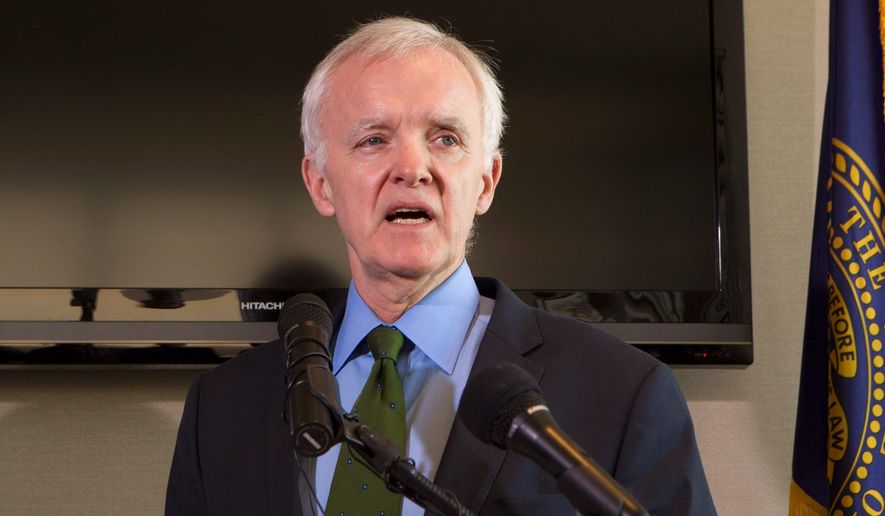Former Democratic Sen. Bob Kerrey says President Trump would be right to pardon anyone ensnared in the special counsel’s Russia investigation if it turns out there was no conspiracy to undermine the 2016 election.
What’s more, Mr. Kerrey, a Medal of Honor recipient and former presidential candidate, said his party is suffering “a delusion” in its obsession with the soon-to-be-released report by special counsel Robert Mueller — and convictions that have arisen from the investigation are tainted.
“If there is a man or woman who was convicted and sentenced for not telling the truth about a collusion that never happened, I’d like them to be pardoned,” Mr. Kerrey, 75, told The Washington Times in an interview.
A former governor of Nebraska, Mr. Kerrey represented the state for two terms in the U.S. Senate. His comments are at odds with those from Democrats on the national stage, who have questioned Attorney General William P. Barr’s summary of the special counsel’s finding that there was no conspiracy between the Trump campaign and Russia.
More pointedly, many Democrats say they see clear evidence that Mr. Trump illegally tried to obstruct the special counsel’s work and cite the convictions Mr. Mueller has secured against a number of Trump associates who lied to investigators.
Mr. Kerrey said that is unfair.
“I know what kind of power a prosecutor has,” he said. “They have a gun to your head, and they know most of these cases never go to trial. So you have a choice of spending the rest of your life in prison or pleading guilty and maybe doing a year.”
His support for presidential pardons is particularly striking because other Democrats have accused Mr. Trump of abusing the power.
Mr. Kerrey said he would like to see a bipartisan, independent panel of prominent people investigate the origins of the Russia probe and recommend who should be pardoned.
The panel also could determine whether an FBI director’s 10-year term is sufficient to keep the bureau free from political influence, recommend rules to prevent political candidates from attempting to influence the bureau via tweets or other communications, and specify the criteria for the FBI to open an investigation, he said.
In addition, the panel could examine critical moments of the past few years, such as former FBI Director James B. Comey’s July 2016 press conference in which he outlined Hillary Clinton’s misdeeds with regard to her email server while announcing that she wouldn’t be charged, or former Attorney General Jeff Sessions’ decision to recuse himself from the Russia investigation.
“When Comey did his press conference, he basically gave Donald Trump his ’lock her up’ applause line, and you have all the problems with Sessions saying he has to recuse himself,” Mr. Kerrey said. “All of that created problems.”
It’s tough to find other Democrats willing to question the origins of the special counsel’s investigation. Mr. Kerrey said he is raising his voice because the nation has become so partisan and fractured that it has become impossible for the American people to learn the truth.
The independent panel can cut through the noise and determine whether the investigation was ever justified, he said.
“I think the public needs to have an independent group evaluate what happened,” Mr. Kerrey said. “You can go back as far as you want, evaluate what went wrong and make recommendations of what to do to ensure the public can trust the results. Maybe they come up with nothing needs to be changed, but I doubt that.”
Mr. Kerrey said the panel should be modeled after the 9/11 Commission. He was one of the five Democrats who worked with five Republicans to study what went wrong with U.S. intelligence leading up to the 2001 terrorist attacks.
Mr. Kerrey said one of the commission’s most valuable services was dispelling conspiracy theories and rumors that arose in the aftermath of the terrorist attacks. He is hoping a similar commission will do the same.
Senate Judiciary Committee Chairman Lindsey Graham, South Carolina Republican, has said he wants to establish a special counsel, similar to Mr. Mueller, to review unanswered questions about the FBI’s decision-making surrounding the key actors in the 2016 election.
But Mr. Kerrey said the country is too partisan to endure another special counsel investigation, especially after Mr. Mueller’s kept the nation tied in knots for 22 months.
Mr. Kerrey saved his harshest criticism for Rep. Adam B. Schiff, California Democrat, chairman of the House Permanent Select Committee on Intelligence and one of the most vocal proponents of the Russian collusion narrative.
Mr. Kerrey, who served on the Senate Select Committee on Intelligence, said Mr. Schiff has politicized a panel that must be free of partisan politics.
“Personally, I would love to hear Schiff say, ’Enough. There are other committees that can look at this, and we need to get back to the committee’s mission of making sure the Department of Defense is spending its money correctly,’” Mr. Kerrey said. “He could gain a lot of credibility with the American people if we go back to the time when that committee was nonpartisan.”
• Jeff Mordock can be reached at jmordock@washingtontimes.com.




Please read our comment policy before commenting.